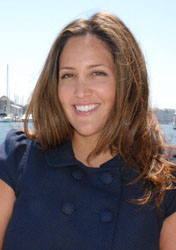Guest contribution by Andrew Delaney, Director of Operations at the National Sports and Entertainment Law Society.
 Vered Yakovee is a dynamic individual. She is well-connected and well-versed in the sports and entertainment law fields. She teaches Sports Law at USC Gould School of Law, practices all aspects of sports law and insurance coverage law, and is Editor-in-Chief of the ABA Forum on the Entertainment and Sports Industries’ Entertainment & Sports Lawyer. I have corresponded with Ms. Yakovee occasionally over the past year, and had the distinct pleasure of meeting her at the Sports Lawyers Association annual conference this spring in Chicago, Illinois, where she was a featured speaker. Ms. Yakovee graciously agreed to the following interview, which was conducted through email.
Vered Yakovee is a dynamic individual. She is well-connected and well-versed in the sports and entertainment law fields. She teaches Sports Law at USC Gould School of Law, practices all aspects of sports law and insurance coverage law, and is Editor-in-Chief of the ABA Forum on the Entertainment and Sports Industries’ Entertainment & Sports Lawyer. I have corresponded with Ms. Yakovee occasionally over the past year, and had the distinct pleasure of meeting her at the Sports Lawyers Association annual conference this spring in Chicago, Illinois, where she was a featured speaker. Ms. Yakovee graciously agreed to the following interview, which was conducted through email.
Andrew Delaney: Describe your path to sports & entertainment law. How did you become EIC of the Entertainment & Sports Lawyer?
Vered Yakovee: I knew that I wanted to work in the sports industry since I was an undergraduate student. Between college and law school, I took my time studying for the LSAT, I coached high school basketball, and I thought about how to approach “sports law.” During law school, I began asking all of the sports lawyers who would give me the time how they got where they are. I found that everyone had a different story. Therefore, I knew that if I stuck to my guns, I would eventually find my own path as well. I became Editor-in-Chief of the ABA’s Entertainment & Sports Lawyer after I wrote a series of articles on all legal aspects of staging large-scale sports events for the journal by request of my predecessor, Bob Pimm.
AD: What do you like and dislike about sports and entertainment law practice?
VY: I can’t think of anything I don’t like about it. It’s a lot of fun.
AD: What are some ways you think this area of the law could improve?
VY: It is hard to speak of “this area of law,” because there is a debate about whether there is a separate body of “sports law.” One opinion is that there are some exclusively sports-related laws, such as Title IX, agent regulations, and the body of law created by Court of Arbitration for Sport (“CAS”) decisions. Another opinion is that all areas of law apply to the sports industry, just as they do to any other industry, and that the concept of “sports law” really refers to endless areas of law to the extent that they touch the sports industry. If the latter is a more accurate description of “sports law,” then the ways in which students can break into the industry are limited only by the imagination of the student. Any area of law that can add value to the sports industry will become an integral part of the “sports law” picture.
AD: Any advice for students interested in the field?
VY: Students should do some things that are typically helpful to breaking into the sports industry. However, students should also remain open to breaking in by new and unique ways. Traditionally, classes including labor and employment, antitrust, general intellectual property classes and specialized intellectual property classes including those on trademark and copyright are helpful. It is also helpful to read industry periodicals including Sports Business Daily, Sports Business Journal, Entertainment & Sports Lawyer, and Sports Litigation Alert. Taking internships for relevant experience, as well as volunteering in other ways for the same reason is beneficial to understanding the industry. Internships and volunteering are also a great way for students to gain an opportunity to showcase that they are reliable and smart in a real-world setting.
AD: What’s a typical day like for you?
VY: As is true for many lawyers, my days are always different. My practice consists of both litigation as well as advising clients on non-litigation matters. Some days I am at USC Gould School of Law, where I teach the Sports Law course to 2L and 3L students. I also spend time between working on behalf of my clients, work on the Entertainment & Sports Lawyer, writing articles, and doing my own volunteer work. My days look different depending on which of these tasks is the priority for that day. I also try to make time to stay active in sports myself, and during summers that means being on the ocean in an outrigger canoe with the Southern California Outrigger Racing Association.